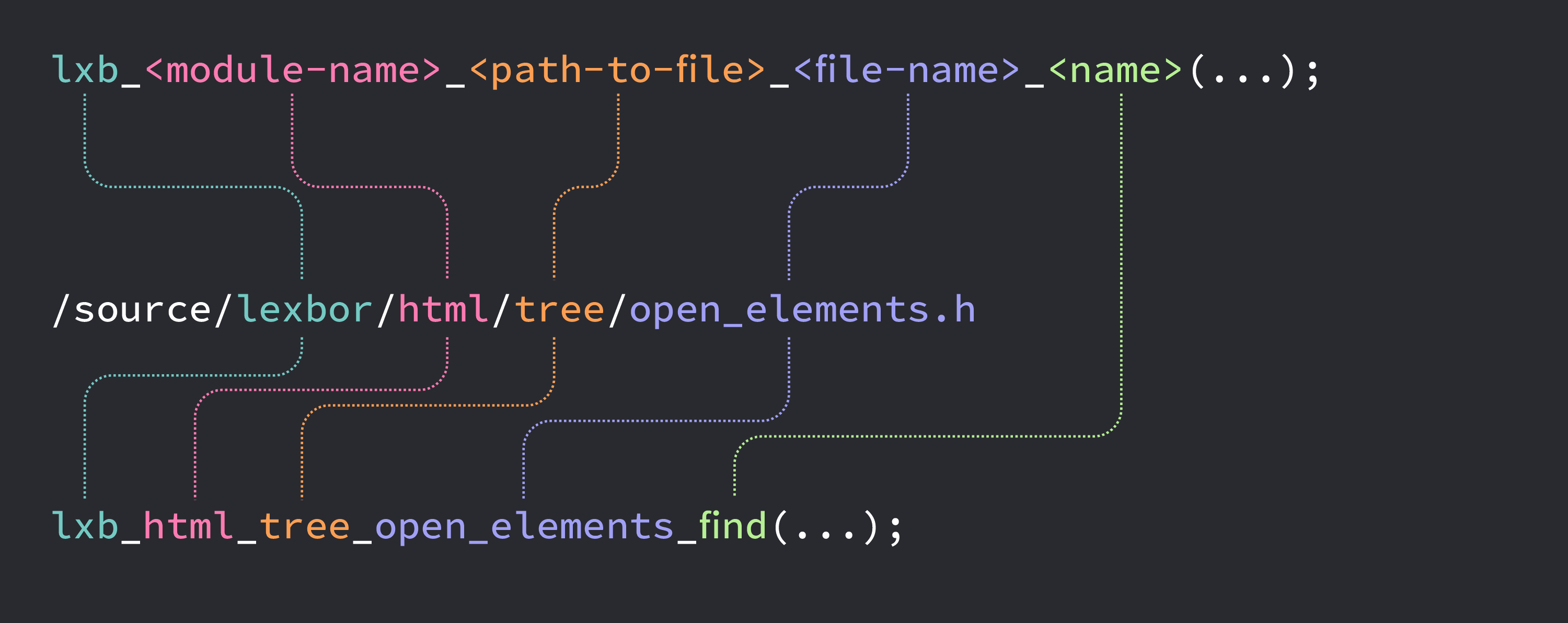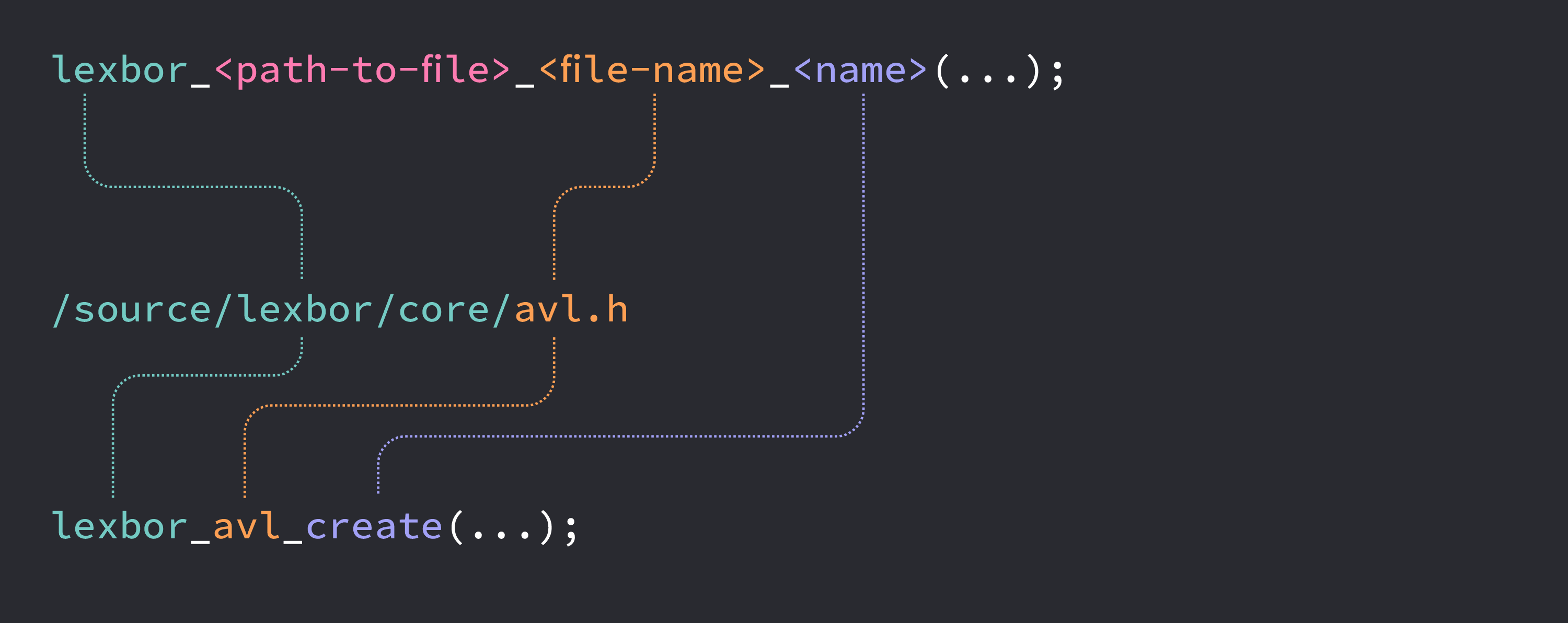Quick Start¶
These steps show how to use lexbor in your code. They assume you are using Linux and gcc.
Install the
lexborlibrary on your system.Let’s parse some sample HTML markup. Save the following code as
myhtml.c:#include <lexbor/html/parser.h> #include <lexbor/dom/interfaces/element.h> int main(int argc, const char *argv[]) { lxb_status_t status; const lxb_char_t *tag_name; lxb_html_document_t *document; static const lxb_char_t html[] = "<div>Works fine!</div>"; size_t html_len = sizeof(html) - 1; document = lxb_html_document_create(); if (document == NULL) { exit(EXIT_FAILURE); } status = lxb_html_document_parse(document, html, html_len); if (status != LXB_STATUS_OK) { exit(EXIT_FAILURE); } tag_name = lxb_dom_element_qualified_name(lxb_dom_interface_element(document->body), NULL); printf("Element tag name: %s\n", tag_name); lxb_html_document_destroy(document); return EXIT_SUCCESS; }
Compile
myhtml.cand run the resulting executable:gcc myhtml.c -llexbor -o myhtml ./myhtml
Installation¶
To install lexbor from binary packages, refer to the Download section.
Source code¶
The source code is available on GitHub.
To build and install lexbor from source, use CMake, an open-source, cross-platform build system.
Linux, *BSD, macOS¶
At the project root:
cmake .
make
sudo make install
Optional flags recognized by the cmake command:
Flag |
Default |
Description |
|---|---|---|
LEXBOR_OPTIMIZATION_LEVEL |
-O2 |
Optimization level for building. |
LEXBOR_C_FLAGS |
Default |
|
LEXBOR_CXX_FLAGS |
Default |
|
LEXBOR_WITHOUT_THREADS |
ON |
Reserved for future use. |
LEXBOR_BUILD_SHARED |
ON |
Create a shared library. |
LEXBOR_BUILD_STATIC |
ON |
Create a static library. |
LEXBOR_BUILD_SEPARATELY |
OFF |
Build all modules separately. Each module will have its own library (shared and static). |
LEXBOR_BUILD_EXAMPLES |
OFF |
Build example programs. |
LEXBOR_BUILD_TESTS |
OFF |
Build tests. |
LEXBOR_BUILD_TESTS_CPP |
ON |
Build C++ tests to verify library operation in C++. Requires |
LEXBOR_TEST_AMALGAMATION |
OFF |
Build tests for the amalgamation file. Requires |
LEXBOR_BUILD_UTILS |
OFF |
Build project utilities and helpers. |
LEXBOR_BUILD_WITH_ASAN |
OFF |
Enable Address Sanitizer if possible. |
LEXBOR_INSTALL_HEADERS |
ON |
Install library headers ( |
LEXBOR_PRINT_MODULE_DEPENDENCIES |
OFF |
Print module dependencies. |
Windows¶
Use the CMake GUI tool.
For Windows with MSYS2:
cmake . -G "Unix Makefiles"
make
make install
Command Line Examples¶
We recommend building the project in a separate directory to easily clean up later, as cmake generates many temporary files:
mkdir build
cd build
To build a debug version of lexbor with Address Sanitizer enabled:
cmake .. -DCMAKE_C_FLAGS="-fsanitize=address -g" -DLEXBOR_OPTIMIZATION_LEVEL="-O0" -DLEXBOR_BUILD_TESTS=ON -DLEXBOR_BUILD_EXAMPLES=ON
make
make test
To build lexbor with tests:
cmake .. -DLEXBOR_BUILD_TESTS=ON
make
make test
sudo make install
To set the installation location (prefix):
cmake .. -DCMAKE_INSTALL_PREFIX=/my/path/usr
make
make install
To install only the shared library without headers:
cmake .. -DLEXBOR_BUILD_STATIC=OFF -DLEXBOR_INSTALL_HEADERS=OFF
make
sudo make install
Code Samples¶
All code samples are available in the lexbor repository under the /examples/ directory.
To build and run the samples:
cmake .. -DLEXBOR_BUILD_EXAMPLES=ON
make
./examples/lexbor/html/element_create
./examples/lexbor/html/document_title
General Considerations¶
We focus on minimal dependencies, custom algorithms, and platform-specific solutions:
The project is written in pure
Cwithout external prerequisites. We believe in a “go hard or go home” approach.While we’re not reinventing every algorithm known to humankind, we handle object creation and memory management in our own way. Many classic algorithms used in
lexborare adapted to meet the specific needs of the project.We’re open to using third-party code, but it’s often simpler to start from scratch than to add extra dependencies (looking at you, Node.js).
Some functions are platform-dependent, such as threading, timers, I/O, and blocking primitives (spinlocks, mutexes). For these, we have a separate
portmodule with its own structure and build rules, distinct from the other modules.
Memory Management¶
There are four main dynamic memory functions:
void *
lexbor_malloc(size_t size);
void *
lexbor_calloc(size_t num, size_t size);
void *
lexbor_realloc(void *dst, size_t size);
void *
lexbor_free(void *dst);
These functions:
Are defined in
/source/lexbor/core/lexbor.h(in the core module).Are implemented in
/source/port/*/lexbor/core/memory.c(in theportmodule).Can be redefined if needed.
As the names suggest, they serve as replacements for the standard malloc,
calloc, realloc, and free. However, unlike free, the lexbor_free
function returns a void * that is always NULL. This simplifies the process
of nullifying freed variables:
if (object->table != NULL) {
object->table = lexbor_free(object->table);
}
Without this, you’d need to explicitly nullify object->table:
if (object->table != NULL) {
lexbor_free(object->table);
object->table = NULL;
}
We’ll discuss other differences later.
Status Codes¶
If a function can fail, it should report the failure. We follow two main rules when working with status codes:
If the status is
LXB_STATUS_OK(0), everything is fine; otherwise, something went wrong.Always return meaningful status codes. For example, if memory allocation fails, return
LXB_STATUS_ERROR_MEMORY_ALLOCATION, not a generic value like0x1f1f.
Status codes are passed as lxb_status_t. This type is defined throughout the
codebase in /source/lexbor/core/types.h, and all available status codes are
listed in /source/lexbor/core/base.h.
Function Naming¶
Most functions follow this naming pattern:

The exception is the core module (/source/lexbor/core/), which uses a
different pattern:

In other words, all lexbor_* functions are located in the core module,
without exceptions.
Header Locations¶
All paths are relative to the /source/ directory. For example, to include a
header file from the html module located in /source/lexbor/html/,
use:
#include "lexbor/html/tree.h"
Data Structures¶
Most structures and objects have an API for creating, initializing, cleaning, and deleting them. This follows the general pattern:
<structure-name> *
<function-prefix>_create(void);
lxb_status_t
<function-name>_init(<structure-name> *obj);
void
<function-name>_clean(<structure-name> *obj);
void
<function-name>_erase(<structure-name> *obj);
<structure-name> *
<function-name>_destroy(<structure-name> *obj, bool self_destroy);
The
*_initfunction can accept any number of arguments and always returnslxb_status_t.Cleanup functions,
*_cleanand*_erase, may return any value, but they typically returnvoid.If
NULLis passed as the first argument (the object) to the*_initfunction, it returnsLXB_STATUS_ERROR_OBJECT_NULL.When the
*_destroyfunction is called withself_destroyset totrue, the returned value is alwaysNULL; otherwise, the object (obj) is returned.The
*_destroyfunctions always check if the object isNULL; if so, they returnNULL.If the
*_destroyfunction doesn’t take thebool self_destroyargument, the object can only be created using the*_createfunction (i.e., not on the stack).
Typical usage:
lexbor_avl_t *avl = lexbor_avl_create();
lxb_status_t status = lexbor_avl_init(avl, 1024);
if (status != LXB_STATUS_OK) {
lexbor_avl_node_destroy(avl, true);
exit(EXIT_FAILURE);
}
/* Do something super useful */
lexbor_avl_node_destroy(avl, true);
Now, with an object on the stack:
lexbor_avl_t avl = {0};
lxb_status_t status = lexbor_avl_init(&avl, 1024);
if (status != LXB_STATUS_OK) {
lexbor_avl_node_destroy(&avl, false);
exit(EXIT_FAILURE);
}
/* Do something even more useful */
lexbor_avl_node_destroy(&avl, false);
Note that this approach is not an absolute requirement, even though it is common. There are cases where a different API may be more suitable.
Modules¶
The lexbor project is designed to be modular, allowing each module to be built
separately if desired. Modules can depend on each other; for instance, all
modules currently rely on the core module.
Each module is located in a subdirectory within the /source/ directory of the
project.
Module Versioning¶
Each module records its version in the base.h file located at the module root.
For example, see /source/lexbor/html/base.h:
#define <MODULE-NAME>_VERSION_MAJOR 1
#define <MODULE-NAME>_VERSION_MINOR 0
#define <MODULE-NAME>_VERSION_PATCH 3
#define <MODULE-NAME>_VERSION_STRING LXB_STR(<MODULE-NAME>_VERSION_MAJOR) LXB_STR(.) \
LXB_STR(<MODULE-NAME>_VERSION_MINOR) LXB_STR(.) \
LXB_STR(<MODULE-NAME>_VERSION_PATCH)
Core¶
This is the base module, implementing essential algorithms for the project, such as AVL and BST trees, arrays, and strings. It also handles memory management. The module is continuously evolving with new algorithms being added and existing ones optimized.
Documentation for this module will be available later.
DOM¶
This module implements the DOM specification. Its functions manage the DOM tree, including its nodes, attributes, and events.
Documentation for this module will be available later.
HTML¶
This module implements the HTML specification.
Current implementations include: Tokenizer, Tree Builder, Parser, Fragment Parser, and Interfaces for HTML Elements.
Documentation for this module will be available later. For guidance, refer to the HTML examples in our repo or the corresponding articles.
Encoding¶
This module implements the Encoding specification.
Current implementations include streaming encode/decode. Available encodings:
big5, euc-jp, euc-kr, gbk, ibm866, iso-2022-jp, iso-8859-10, iso-8859-13,
iso-8859-14, iso-8859-15, iso-8859-16, iso-8859-2, iso-8859-3, iso-8859-4,
iso-8859-5, iso-8859-6, iso-8859-7, iso-8859-8, iso-8859-8-i, koi8-r, koi8-u,
shift_jis, utf-16be, utf-16le, utf-8, gb18030, macintosh, replacement,
windows-1250, windows-1251, windows-1252, windows-1253, windows-1254,
windows-1255, windows-1256, windows-1257, windows-1258, windows-874,
x-mac-cyrillic, x-user-defined
Documentation for this module will be available later. For guidance, refer to the Encoding examples in our repo or the corresponding articles.
CSS¶
This module implements the CSS specification.
Documentation for this module will be available later. For guidance, refer to the CSS examples in our repo or the corresponding articles.